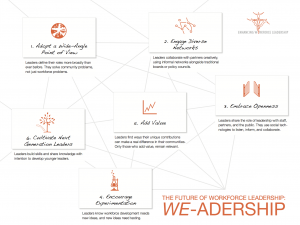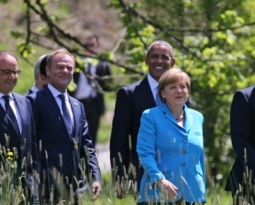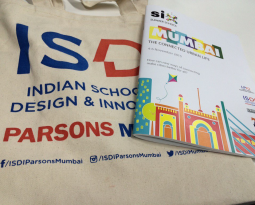Pope Francis: An Unexpected Champion of WEadership
few years back, Vinz Koller and I worked on a leadership project at Social Policy Research Associates (SPR). Commissioned by the US Department of Labor’s Employment and Training Administration, (ETA), the goal was to identify the skills and abilities of effective workforce leaders so that they could be designed into programs and emphasized in the technical assistance offered to the whole system.
We took an ethnographic approach to the project – observing leaders in practice, documenting their activities and approaches, and conducting interviews with them and their peers and colleagues. What we discovered was a new model of leadership – one that is collaborative and practiced completely independently of title. We called it WEadership.
This was 2011. We introduced many concepts that were very new to workforce development at the time:
- Collective Impact
- Social Innovation
- Human Centered Design
- Social Enterprise & Entrepreneurship
- Open Government, Open Data, Transparency & Hackathons
We published a special insert as part of the report that covered social innovation, online gaming, crowdfunding and crowdsourcing, and gov2.0, and a social media guide. And we produced some nice video in an effort to communicate the depth and complexity of the ideas we encountered.
The WEadership Framework
The primary product we developed was a set of six practices that in the aggregate, we called the WEadership framework. The comprehensive guide is here. (We also made a Blurb book out of it and developed a superhero-themed TEDx talk.)
The six practices are:
- Adopting a wide-angle point of view
- Building diverse networks
- Embracing openness
- Encouraging experimentation
- Adding unique value
- Cultivating next-generation leaders
We have since made every effort to build these practices into the technical assistance we provide to current and emerging leaders in a range of public policy areas and build them into our own practice.
But imagine my surprise (and delight) when clicked on a Fast Company link about Pope Francis and leadership and found five of those practices staring back at me.
Pope Francis has shown that he recognizes the intrinsic value of every person.
– William Venderbloemen
The piece, authored by William Vanderbloemen, calls the Pope’s leadership style “transformational,” and identifies five lessons it offers for CEOs, politicians, and “leaders of all stripes.”
- Be Accessible – which in its explanation is quite aligned with the taking a wide-angle point of view (Weadership practice #1). Listening to people from all corners can enable leaders to see problems in relation to one another and develop more creative solutions to them.
- Don’t ignore social media. Embrace openness (Weadership practice #3) was our version – a broader take on approaching social media, as well as data and intelligence from many more sources and people than traditional leaders are accustomed to.
- Flatten your organization. Because the context of our work was not organization-centered, we don’t have a specific parallel to a reimagined organizational chart. But when we spoke to audiences about Weadership, we specifically used flattening hierarchy as the context for engaging diverse networks (Weadership practice #2).
- Take risks. This is Pope Francis’s version of encouraging experimentation (Weadership practice #4) – the descriptions of each are nearly identical.
- Value input from subordinates. Okay, we went a step further here and suggested that a key responsibility of today’s leaders is integrating the most important ideas – no matter where they come from – and cultivating new leaders (Weadership Practice #6) wherever they are. Still, these ideas are certainly from the same branch of the family tree.
Although Vanderbloemen doesn’t call it out as part of the list, he argues that Pope Francis’s approach to leadership also teaches us the importance of taking action – which in concept and detail sounds a lot like adding value (Weadership practice #5).
I’m not a particularly religious person, but like the rest of the world, I listen more to what Pope Francis has to say than any pope in my lifetime, because he’s exercising a form of leadership that goes way beyond administering Vatican functions or protecting Church doctrine. He is a listener. He respects people. He empathizes with those in need. He believes in taking responsibility. In an ideal world, those would be near universal leadership qualities.
Pope Francis is asking all who are willing to collaborate in a grand experiment to improve the human condition. Starting right now, from wherever you are.
That’s what we call WEadership.
And we’re with William Vanderbloemen in thinking we could use more of it.
*Photo credit: MaxPixel.net/St-Peters-Square-Vatican-Pope-Francis-Audience-1784304







